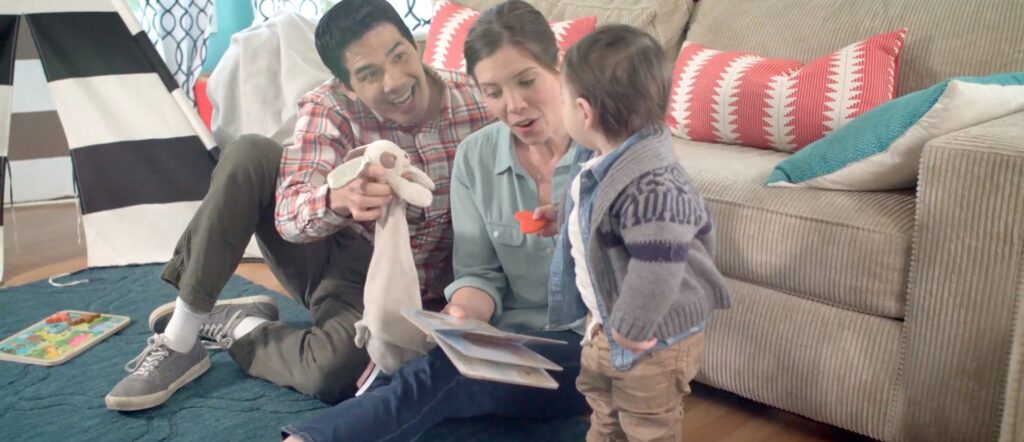Resources for Further Reading

Gopnik, A., Meltzoff, A. N., & Kuhl, P. (2000). The scientist in the crib: What early learning tells us about the mind. New York, NY: Harper Perennial.

Gopnik, A., Meltzoff, A. N., & Kuhl, P. (2000). The scientist in the crib: What early learning tells us about the mind. New York, NY: Harper Perennial.




Using self-talk to teach your child how to label feelings helps her connect her feelings with words. This helps her better understand and express her emotions and experiences. You can play a matching game with your child by showing her pictures of various feelings and matching the facial expressions with the feeling states (happy, sad, […]




Self-talk can be helpful for a wide variety of situations. For instance: • Planning: If you say, “You can have a cupcake after dinner,” your child will tell herself, “First dinner, then a cupcake.” • Self-Guidance: If you’re calm about your own mistakes and say, “I can try again,” your child will learn it’s okay […]




You’re probably very familiar with your own inner voice, but how does your child’s inner voice develop? It comes from you. Your words and tone become the inner voice your child hears when she talks to herself. You can help nurture a positive inner voice that promotes self-regulation and confidence in your child by modeling […]
| Cookie | Duration | Description |
|---|---|---|
| __stripe_mid | 1 year | Stripe sets this cookie cookie to process payments. |
| __stripe_sid | 30 minutes | Stripe sets this cookie cookie to process payments. |
| cookielawinfo-checkbox-advertisement | 1 year | Set by the GDPR Cookie Consent plugin, this cookie is used to record the user consent for the cookies in the "Advertisement" category . |
| cookielawinfo-checkbox-analytics | 11 months | This cookie is set by GDPR Cookie Consent plugin. The cookie is used to store the user consent for the cookies in the category "Analytics". |
| cookielawinfo-checkbox-functional | 11 months | The cookie is set by GDPR cookie consent to record the user consent for the cookies in the category "Functional". |
| cookielawinfo-checkbox-necessary | 11 months | This cookie is set by GDPR Cookie Consent plugin. The cookies is used to store the user consent for the cookies in the category "Necessary". |
| cookielawinfo-checkbox-others | 11 months | This cookie is set by GDPR Cookie Consent plugin. The cookie is used to store the user consent for the cookies in the category "Other. |
| cookielawinfo-checkbox-performance | 11 months | This cookie is set by GDPR Cookie Consent plugin. The cookie is used to store the user consent for the cookies in the category "Performance". |
| CookieLawInfoConsent | 1 year | Records the default button state of the corresponding category & the status of CCPA. It works only in coordination with the primary cookie. |
| elementor | never | This cookie is used by the website's WordPress theme. It allows the website owner to implement or change the website's content in real-time. |
| viewed_cookie_policy | 11 months | The cookie is set by the GDPR Cookie Consent plugin and is used to store whether or not user has consented to the use of cookies. It does not store any personal data. |
| Cookie | Duration | Description |
|---|---|---|
| mailchimp_landing_site | 1 month | The cookie is set by MailChimp to record which page the user first visited. |
| Cookie | Duration | Description |
|---|---|---|
| _ga | 2 years | The _ga cookie, installed by Google Analytics, calculates visitor, session and campaign data and also keeps track of site usage for the site's analytics report. The cookie stores information anonymously and assigns a randomly generated number to recognize unique visitors. |
| _gat_gtag_UA_46801669_2 | 1 minute | Set by Google to distinguish users. |
| _gid | 1 day | Installed by Google Analytics, _gid cookie stores information on how visitors use a website, while also creating an analytics report of the website's performance. Some of the data that are collected include the number of visitors, their source, and the pages they visit anonymously. |
| tk_lr | 1 year | The tk_lr is a referral cookie set by the JetPack plugin on sites using WooCommerce, which analyzes referrer behaviour for Jetpack. |
| tk_or | 5 years | The tk_or is a referral cookie set by the JetPack plugin on sites using WooCommerce, which analyzes referrer behaviour for Jetpack. |
| tk_r3d | 3 days | JetPack installs this cookie to collect internal metrics for user activity and in turn improve user experience. |
| tk_tc | session | JetPack sets this cookie to record details on how user's use the website. |
| Cookie | Duration | Description |
|---|---|---|
| cookies.js | session | No description available. |
| m | 2 years | No description available. |